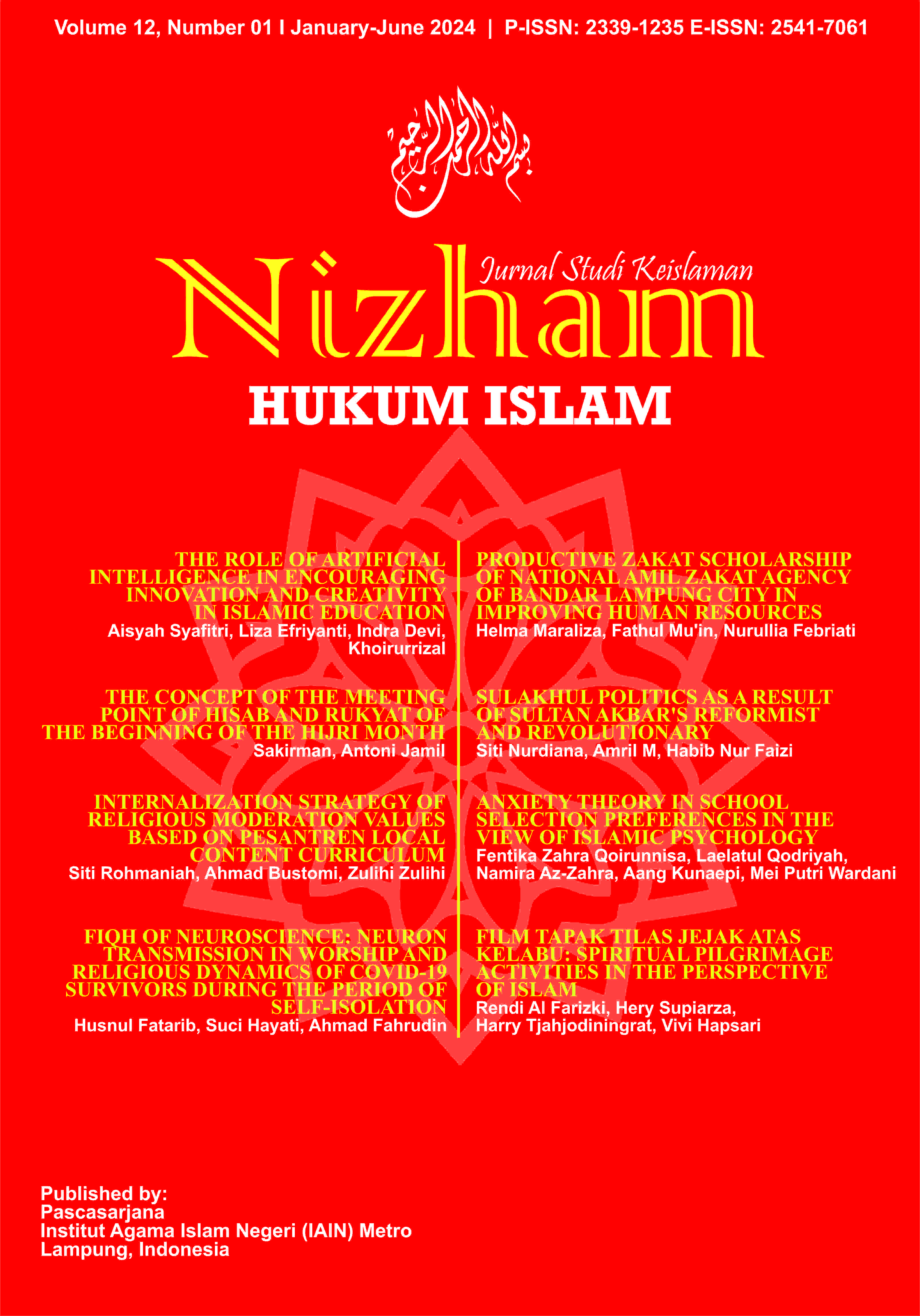The Role of Artificial Intelligence in Encouraging Innovation and Creativity in Islamic Education
DOI:
https://doi.org/10.32332/nizham.v12i01.8602Keywords:
Artificial Intelligence, Innovation, Creativity, Islamic EducationAbstract
The purpose of this study is to explain the role of artificial intelligence in encouraging innovation and creativity in Islamic education at SMPN 2 Tigo Nagari. The method used in this study uses a qualitative method with a case study approach. The case study approach is a powerful tool for exploring a particular situation or event carefully, deeply, and in detail. This approach allows researchers to gain a better understanding of the complexity and dynamics of a phenomenon or problem in a real context. The results of this study indicate that the implementation of artificial intelligence (AI) in Islamic education at SMPN 2 Tigo Nagari has a significant impact despite being faced with several challenges. The utilization of AI in teaching the Qur'an and Hadith brought about an increase in students' understanding of Islamic teachings, with AI facilitating interactive learning and exploration of the meaning of complex verses. Nonetheless, there were a number of challenges, including ethical issues, privacy concerns, and lack of teacher engagement and understanding. The positive impacts seen involve increased student understanding, personalization of learning, stimulating creativity, and management efficiency of educational institutions. AI technologies also create engaging and interactive learning experiences, increasing student motivation. The application of Virtual Reality (VR) and Augmented Reality (AR) also enriches students' contextual experience of Islamic teachings.
Downloads
References
Ali, Nuraliah, Mulida Hayati, Rohmatul Faiza, And Alfi Khaerah. “Artificial Intelligence (Ai) Dalam Pendidikan Islam: Trends, Persepsi, Dan Potensi Pelanggaran Akademik Di Kalangan Mahasiswa.” Injire 1, No. 1 (2023): 51–66.
Aziz, Roychan Abdul, Yuli Fitriyanti, Darnoto Darnoto, And Fathur Rohman. “Tantangan Pendidikan Karakter Islami Di Era Teknologi Artificial Intelligence.” Tarbawi: Jurnal Pendidikan Islam 20, No. 1 (2023).
Elfira, Dilla Gusti, Darul Ilmi, Aisyah Syafitri, Dina Sri Mulyani, And Riko Anas. “Management Of Islamic Education Learning In The Era Of Disruption.” In Imam Bonjol International Conference On Islamic Education, 224–32, 2023.
Fauziyati, Wiwin Rif’atul. “Dampak Penggunaan Artificial Intelligence (Ai) Dalam Pembelajaran Pendidikan Agama Islam.” Jurnal Review Pendidikan Dan Pengajaran (Jrpp) 6, No. 4 (2023): 2180–87.
Gusli, Ramadhoni Aulia, Supratman Zakir, And Muaddyl Akhyar. “Tantangan Guru Terhadap Perkembangan Teknologi Agar Memanfaatkan Artificial Intelligence Dalam Meningkatkan Kemampuan Siswa.” Idarah Tarbawiyah: Journal Of Management In Islamic Education 4, No. 3 (2023): 229–40.
Hilda, Lelya, And Rosimah Lubis. Apmol: Media Teknologi Geometri Molekul Berbasis Augmented Reality Dan Jmol. Samudra Biru, 2021.
Huda, Muhammad Najihul, Marjuki Duwila, And Rohmadi Rohmadi. “Menantang Disintegrasi Moral Di Era Revolusi Industri 4.0: Peran Revolusioner Pondok Pesantren.” Journal Of Islamic Education 9, No. 1 (2023): 1–13.
Ifadah, Luluk, And Sigit Tri Utomo. “Strategi Pembelajaran Pendidikan Agama Islam Dalam Menghadapi Tantangan Era Revolusi Industri 4.0.” Al Ghazali 2, No. 2 (2019): 51–62.
Kisno, Kisno, Nia Fatmawati, Revina Rizqiyani, Siti Kurniasih, And Eka Mei Ratnasari. “Pemanfaatan Teknologi Artificial Intelligences (Ai) Sebagai Respon Positif Mahasiswa Piaud Dalam Kreativitas Pembelajaran Dan Transformasi Digital.” Ijigaed: Indonesian Journal Of Islamic Golden Age Education 4, No. 1 (2023): 44–56.
Maulana, Rizki, Satria Wiguna, And Nurmisda Ramayani. “Upaya Meningkatkan Metakognisi Siswa Melalui Metode E-Learning Di Era 5.0 Pada Mata Pelajaran Alqur’an Hadist Kelas Viii Mts Ppm Al-Fath Desa Air Hitam.” Jurnal Riset Rumpun Ilmu Pendidikan 1, No. 2 (2022): 302–10.
Sabri, Ahmad. Pendidikan Islam Menyongsong Era Industri 4.0. Deepublish, 2020.
Sarinda, Fitri, Martina Martina, Dwi Noviani, And Hilmin Hilmin. “Pendidikan Agama Islam Berbasis Teknologi (Ai) Artificial Intelligence.” Jurnal Kajian Penelitian Pendidikan Dan Kebudayaan 1, No. 4 (2023): 103–11.
Sucipto, Arief Syarifuddin, Adit Febrianto, Zulham M Rais, And Dede Indra Setiabudi. “Dakwah Di Era Teknologi Informasi: Manfaat, Tantangan, Dan Strategi Penggunaan Artificial Intelligence (Ai) Dan Internet Of Things (Iot) Dalam Dakwah.” Relinesia: Jurnal Kajian Agama Dan Multikulturalisme Indonesia 2, No. 1 (2023): 86–93.











